The betta is a popular fish among aquarium lovers, but have you heard of the dragon scale subvariant? Dragon scale bettas are relatively new to the scene but are becoming increasingly popular for their unique and beautiful scales.
As with any pet, it’s essential to do your research before bringing one home. This care guide will cover everything you need to know about dragon scale bettas!
Characteristics/Appearance/LifeSpan
Common Name (species)
Dragon Scale Betta Fish, Betta Splendens, Siamese Fighting Fish
Family
Osphronemidae, Gourami
Origin
Southeast Asia
Diet
Carnivore
Care Level
Easy to Intermediate
Activity
Active, social, alert
Temperament
Gentle for the most part but can be territorial when threatened
Tank Level
Bottom
Minimum Tank Size
5 Gallons
Temperature Range
75-86 degrees Fahrenheit.
Water Hardness
8 and 25 KH
pH Range
6.5 – 7.5
Filtration/Flow Rate
Calm
Breeding
Egg layer
Compatibility
Calm, similarly sized fish
OK, for Planted Tanks?
Yes, but avoid plants with jagged edges
Like their regular betta counterparts, Dragon scale bettas are tropical fish native to Southeast Asia. They get their name from their unique and beautiful white scales covered by an iridescent layer, giving them a shimmery, metallic color.
Though their color variations are not as varied as regular bettas, the stark contrast between their white base color and red fins makes for a beautiful and eye-catching breed of betta fish.
Activity Level/Temperament
Bettas, in general, have a reputation for being aggressive fish. However, this is usually only seen in male bettas placed close to each other. Under these circumstances, male bettas will act aggressively toward each other to establish dominance and territory. Dragon scale bettas behave similarly because they are the same species as regular bettas.
Under most circumstances, however, these beautiful-looking fish are rather peaceful. They spend most of their time swimming around the tank and exploring their surroundings. They will also get along with compatible fish types, which we will cover in more depth below.
Compatibility/Mates
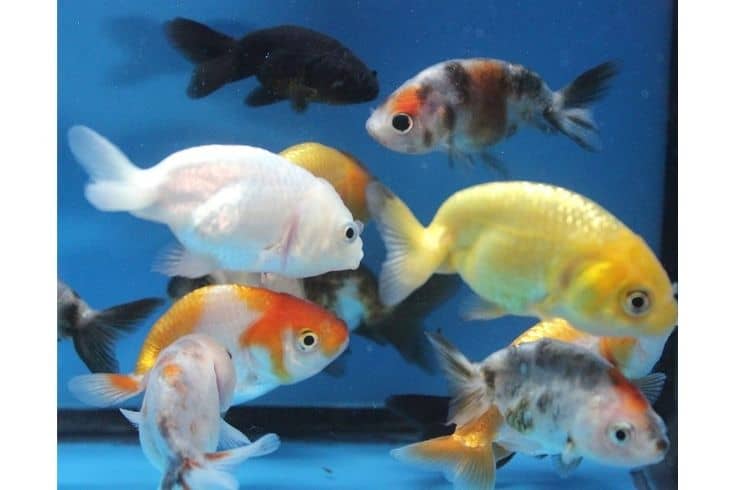
Choosing the right species of fish is half the battle when it comes to compatibility. As we’ve previously mentioned, dragon scale bettas can get along with your average fish as long as they are not too aggressive. Generally, this refers to tropical freshwater fish with calm and peaceful temperaments. Some examples of excellent tank mates for dragon scale bettas include:
- Gouramis
- Danios
- Rasboras
- Corydoras catfish
These peaceful fish will not only get along with your beautiful betta fish, but will also hold their own against any aggressive fish that may try to bully them. As much as we wish it weren’t the case, this also refers to dragon scale bettas.
Fish species to avoid include multicolored fish and other fin-nipping fish species. The former will cause your dragon scale betta stress because they are trying to establish their place in the hierarchy, and the latter will cause physical harm. Other than that, however, any similarly sized fish should do just fine.
Feeding Guide
What To Feed
Some people may think that dragon scales are such expensive betta fish, so they’d be difficult to care for. In reality, however, they are just as easy to take care of as any other type of betta fish. All these gorgeous fish need to stay healthy and happy is a good diet and clean water.

Dragon scale bettas are carnivores, so their diet should consist mostly of protein. A good diet for these fish includes:
- Bloodworms
- Brine shrimp
- Mosquito larvae
- Krill
- Tubifex worms
You can also supplement their diet with pellets or flakes, but make sure that the food you’re giving them is high in protein. Most pet stores will have a good selection of betta-specific food that will suit your dragon scale betta just fine.
Frequency Of Feeding
A healthy betta fish is one that is well-fed. However, you don’t want to overfeed your fish, which can lead to health problems. A good rule of thumb is to feed an eyeball-sized portion of food twice a day. Remember that pellets expand, so don’t go overboard with them.
If there’s any food left over after your feeding sessions, be sure to remove it from the tank. Leftover food will pollute the water and can lead to health problems for your fish.
Tank Requirements
Cool! Now that we know what dragon scale bettas eat, let’s move on to their tank requirements. These popular fish aren’t super nitpicky, but they do have a few specific needs that their owner should be aware of.
Tank Size
A 5-gallon tank is the minimum size you should get for your dragon scale betta. If you plan to keep your fish in a community tank, you’ll need an even larger tank to accommodate all of your fish. To calculate your ideal tank size, you can use the “1 gallon per inch of fish” rule or simply allocate about 10 gallons per fish to be on the safe side.
Size matters this much because a larger body of water does a better job at keeping the water quality stable. This is especially important for dragon scale bettas because they are susceptible to ammonia poisoning and other water-quality related problems.
Wild bettas may not be as sensitive, but because bettas are such popular fish, many of them have been weakened through generations of inbreeding. This makes them more susceptible to diseases and illnesses, which is why a stable water quality is so important for these fish.
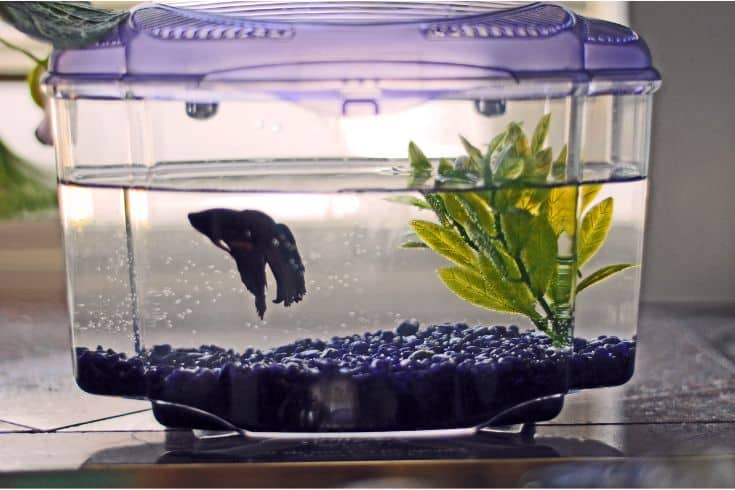
Tank Setup
You will need:
- A 5-gallon tank
- Water conditioner
- Heater
- Filter
- Substrate
- Live plants
- Aquarium test kit
Step 1: Fill your tank with treated water. Tap water usually contains chemicals that can be harmful to fish, so it’s important to use a water conditioner to remove these chemicals.
Step 2: Install a heater in your tank. Dragon scale bettas come from tropical climates and need warm water to thrive. A good rule of thumb is maintaining a water temperature of 78-80 degrees Fahrenheit.
Step 3: Add a filter to your tank. This is important because it will help to keep the water quality stable. A good filter will also help to oxygenate the water, which is important for all fish.
Step 4: Choose a substrate for your tank. Dragon scale bettas are not picky when it comes to substrate, so you can choose whatever you like. Some popular options include gravel, sand, and marbles.
Step 5: Decorate your tank with live plants. Dragon scale bettas love to hide among the plants, which is a great way to make them feel more comfortable in their new home. Be sure to choose plants that are safe for bettas and that will not uproot easily.
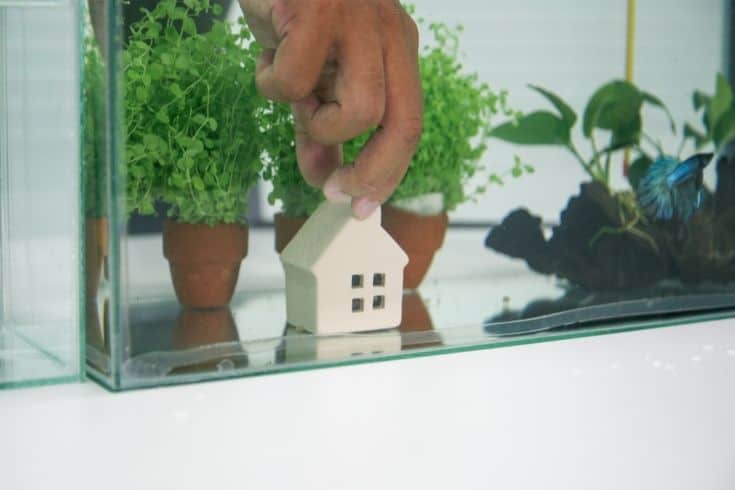
Step 6: Test the water quality in your tank. This is important to do regularly to ensure that the water is safe for your fish. A simple test kit can be purchased at most pet stores.
Step 7: Add your dragon scale betta to the tank. Once everything is set up and the water is tested, you can add your fish to the tank! Keep an eye on him for the first few days to make sure that he is adjusting well to his new home.
Habitat Requirements
Now that you know what size tank you need and how to set it up, let’s talk about the specific habitat requirements for dragon scale bettas:
Water Requirements
Like most bettas, dragon scales require balanced water parameters in order to thrive. The ideal water temperature for these fish is 75-86 degrees Fahrenheit and the pH should be between 6.5 and 7. You can add indian almond leaves to the water to keep your water slightly acidic, though you should monitor the pH levels carefully to make sure that it does not drop too low.
A dragon scale betta’s ideal parameters include a water hardness of 5-20 dGH. If your water is too soft or too hard, it can cause stress and health problems for your fish.
Filtration Requirements
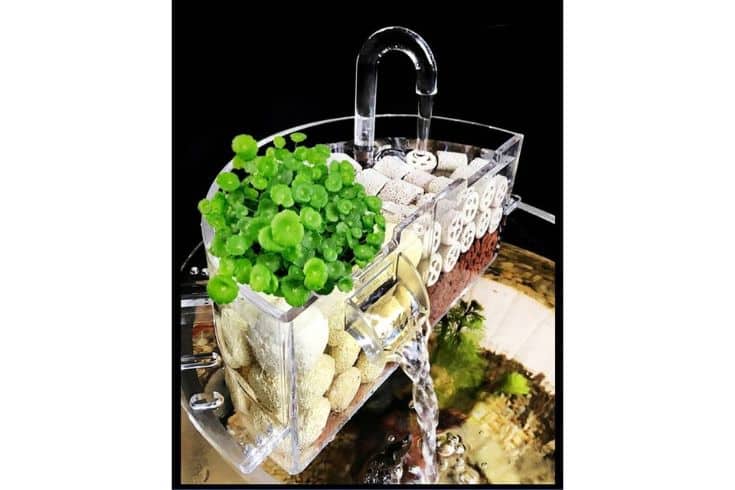
A good tank filter keeps water clean and well-oxygenated, which is why they are must-haves for anyone who hopes to raise healthy fish. Size is important when choosing a filter for your tank, but it’s not the only thing you should consider. The flow rate is also important because dragon scale betters do not do well in strong currents.
In fact, most bettas prefer a mild current because it simulates their natural environment. Their long, weighty fins can also make it difficult for them to swim against a strong current, so pick something that will create a gentle flow while filtering effectively.
Heat and Lighting Requirements
We’ve mentioned that bettas prefer water temperatures between 75-86 degrees Fahrenheit, but it doesn’t mean that you can swing wildly between those two extremes. In fact, sudden temperature changes can cause stress and health problems for your fish. That’s why keeping the tank temperature stable is important by using a good aquarium heater.
As for lighting, dragon scale bettas don’t have any specific requirements. They can do well in either low or bright light, so it’s really up to you. Just be sure to avoid anything that will create too much of a glare in the tank, as this will stress your fish out and make it difficult for him to see.
Plants and Decorations
Captive-bred Betta splendens retain much of their wild instincts, which means they love hiding away in planted tanks. That’s why we recommend adding live plants to your tank. Not only will they provide your fish with a place to hide, but they will also help to oxygenate the water.
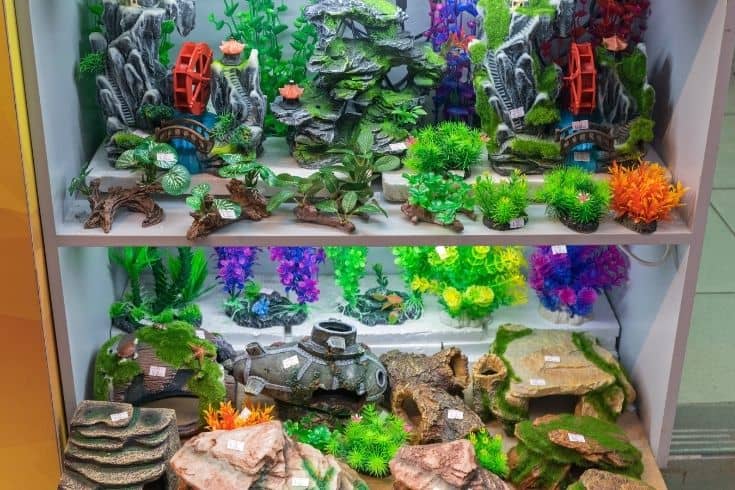
Some of the best plants for bettas include Java fern, anubias, and hornwort. Be sure to choose plants that are safe for bettas and that will not uproot easily.
As for decorations, feel free to get creative! Just be sure that any objects you add to the tank are safe for bettas and that they won’t cause any problems with the water quality.
Habitat Maintenance
Last, proper habitat maintenance is essential to keeping your fish happy. The good news is this does not demand any extra care beyond what most fishkeepers already do as part of their regular tank maintenance routine.
Generally speaking, you want to keep ammonia and nitrite levels as low as possible. An acceptable level of nitrate is between 0.0 and 0.2 ppm, but the lower the better. Water changes are the best way to keep these levels in check, so be sure to do one every week or two.
As for the actual cleaning, you’ll want to vacuum the gravel and wipe down the glass every few weeks. Avoid any harsh chemicals that could harm your fish or plants.
Health
As your fish ages, it will become more susceptible to health problems. The best way to keep your fish healthy is to provide him with a clean, stress-free environment. However, even with proper care, some health problems are inevitable.
Some of the most common health problems for dragon scale bettas include:
Health Issue
Ich (White Spot Disease)
Symptoms or Causes
Ich is a very common disease that’s caused by an aquatic protozoan parasite.
Fish infected with Ich develop a sprinkling of tiny white spots on their fins, gill covers, and bodies. They also flash against the gravel and other solid objects in the aquarium.
Suggested Action
Raise the water temperature to 82o F for three days. Use an OTC White Spot Disease medication to treat the tank.
Health Issue
Flukes
Symptoms or Causes
Flukes is the term used to describe various types of external fish parasites. These macroparasites can often be seen with the naked eye attached to the fish’s skin or gills.
Suggested Action
Treat the fish tank with an OTC antiparasitic medication.
Health Issue
Fungal infections
Symptoms or Causes
White fluffy growths on the fish’s body, mouth, and head.
Suggested Action
Quarantine infected fish, and treat with an antifungal medication.
Health Issue
Bacterial infections
Symptoms or Causes
Sores and ulcers on the body and head, ragged, bloody fins.
Suggested Action
Treat the tank with OTC antibacterial treatment.
While these are some of the most common health problems that dragon scale bettas face, many others can also affect them. If you notice any changes in your fish’s behavior or appearance, be sure to take him to the vet for a checkup or consult a qualified aquarium specialist.
Breeding
We’ve touched briefly on the fact that dragon scale bettas were developed as the result of careful selective breeding. While we’d recommend leaving complex breeding projects to the experts and reputable breeders, it is possible for the average hobbyist to breed these fish successfully.
If you’re interested in breeding your own dragon scale bettas, you’ll need to set up a breeding tank first. Place the male betta in the tank, and allow him to build a bubble nest. Once he’s done this, you can add the female betta fish to the tank.
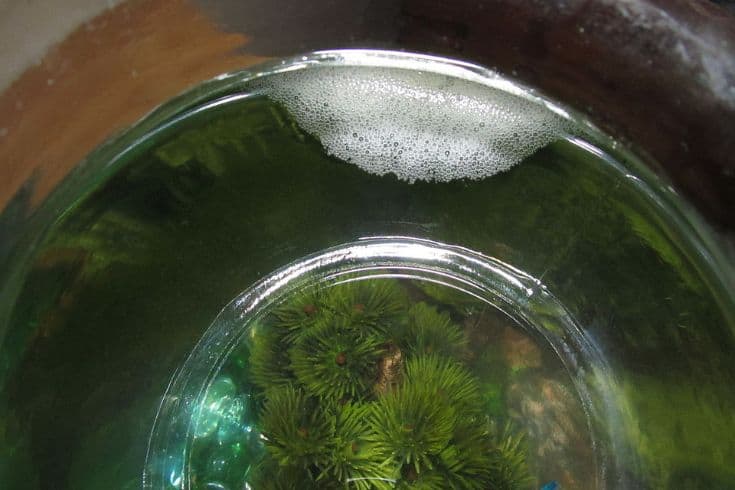
The male will then chase the female around until she is ready to spawn. He will wrap his body around hers and release his sperm when this happens. These fertilized eggs are then deposited in the bubble nest.
Once the eggs have hatched, you will need to remove the fry from the breeding tank and raise them separately.
Product Recommendations
Before we wrap up this article, we wanted to share a few product recommendations that we think will be helpful for anyone keeping dragon scale bettas. These are some of our favorite basic supplies:
- API Tap Water Conditioner: This water conditioner will remove harmful chemicals from your tap water, making it safe for your betta to live in.
- Tetra Bettamin Worm-Shaped Bites: This fish food is high in protein and designed specifically for bettas. It will help keep your fish healthy and strong.
- Tetra Whisper Power Filter: This small filter is designed for use in aquariums for up to 10 gallons. It will help keep your betta’s water clean and healthy.
- Aqueon Flat Heater: This heater is designed to be used in small tanks. It will help maintain a constant water temperature, which is essential for bettas.
The Takeaway
Dragon scale bettas are beautiful, unique fish that make great pets. We hope that this article has given you some helpful information on their care and breeding.
If you’re considering adding one of these fish to your home aquarium, please leave a comment below to let us know how it goes. And if you know someone else who’s thinking about getting a dragon scale betta, please share this article with them!
Thanks for reading, and as always, happy fishkeeping!
